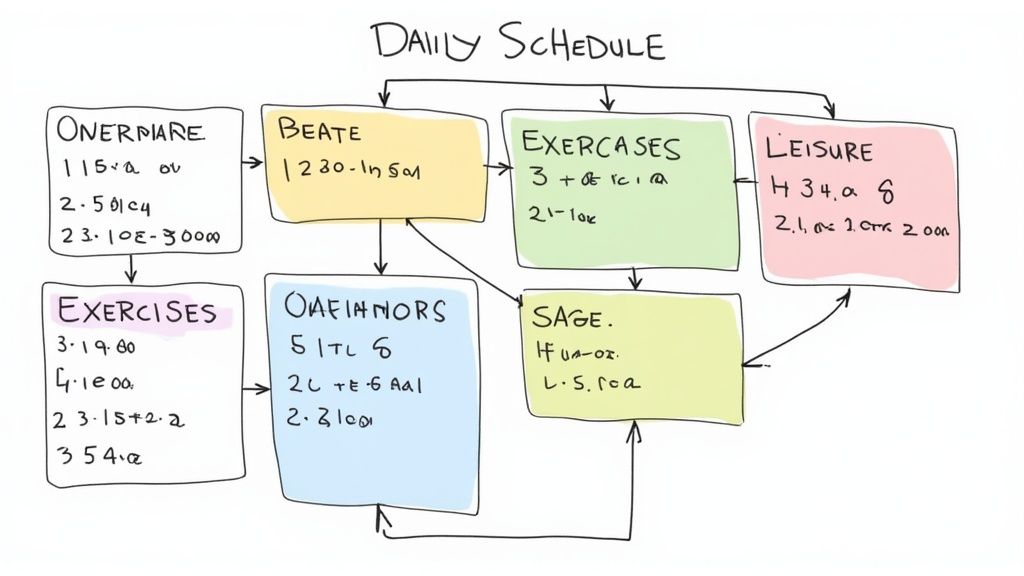15 Time Management Strategies for Students: A Complete Success Guide
Transform your academic journey with proven time management strategies backed by research. Discover actionable techniques that balance your coursework, social life, and personal growth while maximizing study productivity. meta t: 15 Time Management Strategies for Students: A Complete Success Guide published: No slug: time-management-strategies-students-success-guide
Why Students Struggle with Time Management

Moving from high school to college brings major changes in how students manage their time. The rigid bell schedules and teacher oversight disappear, replaced by open blocks of time that students must structure themselves. This sudden freedom, while exciting, often catches many students off guard as they try to stay on top of assignments and deadlines.
The core challenge lies in the dramatic shift in responsibility. High school teachers typically provide frequent reminders and clearly structured due dates. College professors, however, expect students to track and manage deadlines independently. This requires self-discipline and organizational skills that take time to develop, especially given the increased workload and complexity of college courses.
Common Time Management Obstacles
Several key factors make time management particularly difficult for college students. When these challenges pile up, they can create a cycle of falling behind and feeling overwhelmed. The most common roadblocks include:
Social Media and Technology: The constant pull of notifications and social apps fragments study time and makes it hard to focus for extended periods
Poor Planning Skills: Many students haven't learned how to break down big projects or create realistic study schedules
Heavy Course Loads: Juggling multiple classes with different deadlines and requirements can quickly become overwhelming
Social-Academic Balance: Finding the right mix of study time and social activities takes trial and error for most new college students
Research shows that 86% of college students face significant challenges with time management. You can find more details in this report on time management statistics and trends. Getting a handle on time management makes a real difference - students who manage their time well are 53% more likely to earn higher grades.
Adapting to College Life
Success in college requires developing time management approaches that fit the university environment. The key is understanding your personal productivity patterns and building systems around them. For example, some students do their best work early in the morning, while others hit their stride late at night. Learning your peak productivity times lets you schedule important work when you're at your best. Breaking large assignments into smaller chunks also helps prevent procrastination by making the workload feel more manageable. When students combine these insights with consistent planning habits, they're better equipped to handle college demands.
Essential Time Management Skills for Academic Success

Great time management in college is about more than just keeping a calendar. It requires developing specific abilities that help students handle their academic responsibilities effectively. When students master these core skills, they're better equipped to excel in their studies and maintain a balanced college life.
Prioritization: The Art of Choosing Wisely
Learning to prioritize tasks is like being a doctor in the emergency room - you need to know what needs immediate attention and what can wait. For instance, finishing a major research paper due next week should come before starting the reading assignment that's due in a month. Being able to spot what's most important and tackle it first helps students stay on track and avoid last-minute stress.
Decision-Making: Avoiding Analysis Paralysis
Good decision-making goes hand in hand with prioritization. College students face countless choices each day - from picking classes to managing their free time. Getting stuck in endless deliberation wastes precious time and energy. Making clear, timely decisions (even if they're not perfect) lets students focus on getting things done instead of getting caught up in overthinking.
Planning: Building a Roadmap for Success
A solid plan puts prioritization and decision-making into practice. This means creating a detailed study schedule, setting goals you can actually achieve, and blocking out specific times for different activities. Think of your plan like a GPS - it guides you through your week while leaving room to take detours when unexpected things pop up.
Adapting to the College Landscape
Starting college often throws students for a loop when it comes to managing their time. Many haven't learned these skills in high school - in fact, 47% of students say they never got any formal training in time management before college. According to research from LifeHack Method, about half of college students struggle to balance their studies with social life. The numbers show where students need the most help: 42% have trouble organizing course materials and deadlines, while 33% find it challenging to plan their schedules effectively. This highlights why colleges need to step up and provide resources to help students develop these crucial skills as they adjust to more independent college life.
Mastering Study Session Productivity

Getting the most out of your study time isn't just about showing up - it's about studying smarter, not harder. Let's look at proven ways to make your study sessions more productive and focused, so you spend less time staring at textbooks and more time actually learning.
Structuring Study Sessions for Peak Performance
The key to productive studying is breaking it into manageable chunks. The Pomodoro Technique is particularly effective - you study for 25-minute blocks with short breaks in between. After four blocks, take a longer 20-30 minute break. This method helps you stay sharp and avoid burning out.
For more guidance on managing your time effectively as an online student, check out these research-backed strategies from the University of Florida Online.
Some other helpful approaches include:
Time Blocking: Set aside specific times for each subject, just like a class schedule. This helps you stay focused on one topic at a time.
Task Batching: Group similar activities together - do all your reading first, then move on to practice problems. This helps your brain stay in one mode.
Location Switching: Move between different study spots like the library, coffee shop, or study room to stay fresh and engaged.
Adapting to Different Subjects and Learning Styles
Everyone learns differently. Visual learners might prefer diagrams and flashcards, while auditory learners often benefit from recording and replaying lectures. Kinesthetic learners typically grasp concepts best through hands-on practice.
Match your study method to the subject too. Break complex topics into smaller pieces. Use spaced repetition for memorization-heavy subjects. For analytical topics, focus on working through practice problems step by step.
Maintaining Focus and Preventing Burnout
Study sessions can drain your energy fast if you're not careful. Take regular breaks, but avoid getting sucked into social media during these pauses. Instead, go for a quick walk, do some stretches, or try a short meditation.
Your overall health plays a huge role in how well you can focus. Get enough sleep, eat well, and exercise regularly. These basics matter more than pulling all-nighters. Remember - steady progress beats sporadic cramming every time. Build study habits you can stick with for the long run.
Creating Balance Between Academics and Life
College success extends beyond just getting good grades - it's about managing both your studies and your personal life well. Staying connected with friends and family, doing things you enjoy, taking care of your health, and handling everyday stress all matter alongside your academic work. While it can be challenging to handle everything at once, having good strategies helps you create a fulfilling college experience.
Building a Flexible Routine
Start by creating a schedule that can adapt to both planned and unexpected activities. Rather than following a rigid timetable, think of your weekly schedule as a guide that outlines your core commitments while leaving space for spontaneous activities. Block out specific times for classes and studying, but keep some flexibility for meeting friends or handling personal matters. This approach helps you stay organized without feeling restricted.
Establishing Support Systems and Boundaries
Having people you can rely on makes a big difference in college life. Build connections with friends, family members, classmates, and academic advisors who can offer encouragement and help when needed. At the same time, set clear limits to protect your study time and personal space. Let roommates know your study hours to minimize interruptions, which helps you focus better and enjoy your free time more fully.
Prioritizing and Managing Commitments
Learning to prioritize effectively helps you balance academics and personal life. The Eisenhower Matrix tool helps sort tasks by both urgency and importance, making it easier to focus on what really matters. This way, you can give proper attention to both your studies and personal activities. Don't feel bad about saying no to extra commitments that don't fit your priorities - protecting your time and energy helps maintain balance.
Practical Strategies and Examples
Here's how to put these ideas into practice:
Monday-Friday: Use mornings for classes and focused studying. Save evenings for clubs, social time, or personal activities.
Weekends: Split time between catching up on assignments and taking breaks to recharge. Mix productive work with relaxation to avoid burnout.
During busy periods like finals week, you might need to adjust this schedule. This could mean temporarily cutting back on social activities or changing your study routine to prepare for exams. The key is staying flexible while taking care of yourself throughout the term.
Using Digital Tools to Master Your Time
Digital tools can help students study more efficiently, but choosing and using them wisely is key. Let's explore practical ways to make technology work for you without letting it take over your schedule.
Finding Tools That Match Your Study Style
Start by identifying your biggest time management challenges before downloading new apps. If you keep missing assignment deadlines, a simple calendar with reminders might be the solution. When social media keeps pulling you away from work, website blockers can help you stay focused.
Here are some reliable tools to consider:
Calendar Apps: Google Calendar, Apple Calendar, Outlook Calendar
To-Do List Apps: Todoist, Microsoft To Do, Any.do
Focus Apps: Forest, Freedom, Focus@Will
Try different apps to see what fits your study habits. For instance, if you use Obsidian, tools like Obsibrain can help by putting your tasks, notes, and goals in one place.
Setting Up Smart Shortcuts
Let technology handle the small stuff so you can focus on learning. Set up recurring calendar reminders for classes and study sessions. Use note-taking apps to organize research and create study guides. Even basic email filters can save hours of sorting through messages.
Keeping Track of Due Dates
Digital calendars and to-do lists give you one place to see all your assignments and commitments. Color-code different subjects and sort tasks by due date to stay on top of deadlines. Many apps can sync with your school's online system to automatically add assignment due dates to your calendar.
Staying Focused Despite Digital Distractions
While the right apps can boost your productivity, they can also pull you off track if you're not careful. Set clear rules for when you'll check social media or browse online. During study time, use website blockers or app timers to avoid distractions. Remember - your apps should help you reach your goals, not control how you spend your time. When you choose and use digital tools thoughtfully, they become valuable aids for managing your schedule effectively.
Building Your Sustainable Success System
Managing your time in college is about developing a flexible approach - not sticking to rigid schedules. The key is creating habits and systems that adapt with you as your needs and challenges evolve throughout your college experience.
Designing Your Personalized Time Management Approach
Start by taking an honest look at your current habits and patterns. Do you get easily distracted? Struggle to start assignments early? Understanding your specific challenges helps you choose the right strategies to address them. For instance, if staying focused is tough, you might benefit from using the Pomodoro Technique to work in focused bursts.
Think of building your system like customizing a vehicle - you pick the elements that match your style and needs. What works great for your roommate might not suit your schedule or study habits at all.
Implementing Flexible Routines
The best time management system bends but doesn't break when life gets chaotic. Begin by blocking out your fixed commitments like classes and work hours. Then fill in study blocks, club meetings, and personal time around those anchors.
Here's how to make your schedule work:
Set clear priorities: Use the Eisenhower Matrix to identify what truly needs your attention first
Build in buffer time: Leave gaps in your schedule to handle unexpected events without derailing your whole day
Create themed days: Dedicate specific days to certain activities - like Monday for writing assignments and Wednesday for lab work
Handling High-Pressure Periods and Maintaining Motivation
Even with solid systems, motivation can drop during stressful times like midterms and finals. Just like an athlete needs extra fuel for big games, you need specific strategies for these intense periods:
Break big projects into chunks: Tackle one small piece at a time to avoid feeling overwhelmed
Adjust your commitments: Temporarily scale back on optional activities to focus on priorities
Celebrate progress: Reward yourself for completing difficult tasks - even small wins deserve recognition
Tracking Progress, Making Adjustments, and Building Long-Term Habits
Treat your time management system as a work in progress. Review it regularly - are you meeting your goals? Feeling balanced? Make tweaks based on what you learn about your habits and needs.
Remember that mastering time management is like building any other skill - it takes practice and patience. Focus on steady improvement rather than perfection. Over time, these approaches will become natural habits that support both your academic success and overall wellbeing.
Are you ready to take your productivity to the next level? Obsibrain helps you manage tasks, notes and goals all in one place. Learn more at Obsibrain
Last updated